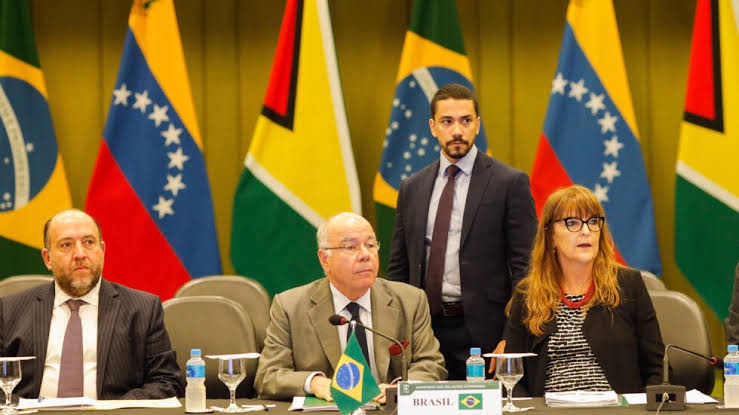Top diplomats from Venezuela, Guyana convene in Brazil to address Essequibo border dispute

The foreign ministers of Guyana and Venezuela, Hugh Hilton Todd and Yvan Gil, engaged in crucial discussions in Brazil’s capital on Thursday, aimed at addressing the long-standing and contentious border dispute over the Essequibo region, known for its significant oil resources.
This marked the first high-level meeting between the two nations since their respective presidents convened a crisis summit in Saint Vincent and the Grenadines last month.
Upon arriving at Brazil’s foreign ministry headquarters for the meeting, neither diplomat issued statements, maintaining a low profile. The meeting, attended by Brazilian Foreign Minister Mauro Vieira, was closely watched by international observers who remain skeptical about a significant breakthrough due to the entrenched positions of both nations.
The Essequibo region, constituting about two-thirds of Guyanese territory, has been a source of heightened tension, prompting international concern over the potential for a military conflict in the generally peaceful South American region. Despite this, Presidents Irfaan Ali and Nicolas Maduro, at their December 14 meeting, agreed not to resort to force, easing immediate fears of military confrontation.
Essequibo has been under Guyana’s administration for over a century, but it faces a legal challenge before the International Court of Justice (ICJ) in The Hague—an avenue Venezuela rejects. The region is home to 125,000 of Guyana’s citizens, and its significance escalated when ExxonMobil discovered substantial crude reserves in 2015. Last year, Georgetown’s auctioning of oil blocks in the disputed area further fueled tensions.
While the meeting in Brasilia may not yield a comprehensive solution, the diplomatic engagement signals a commitment to mutual assurances and maintaining peace, according to Ivan Rojas, a Venezuelan international relations professor. The region’s importance was underscored when the US held joint military exercises with Guyana, and Britain sent a warship to Guyanese waters, triggering a defensive military deployment by Venezuela.
In a joint statement, both nations affirmed their commitment to the December agreement, emphasizing the importance of peace. Guyana’s President Ali expressed optimism about the meeting’s outcome, characterizing it as a vital step towards fulfilling the December agreement, which outlines the creation of a commission to address consequential matters and proposes additional presidential meetings.
Venezuela’s Yvan Gil described the dialogue as a “success for diplomacy” and emphasized its role in removing any potential for conflict beyond the territorial controversy. Venezuelan President Maduro echoed a commitment to diplomacy, dialogue, and peace. Acting as a mediator, Brazil welcomed the ongoing dialogue process and the engagement of both nations in resolving the complex Essequibo border dispute.
The historical context of Venezuela’s claim dates back to 1777 when it was part of the Spanish empire, while Guyana, a former British and Dutch colony, maintains that the border was settled in 1899 by an arbitration court in Paris. The intricate negotiations will likely continue, with the hope of finding common ground on issues such as trade, climate, energy security, and initiatives to expand bilateral trade.












